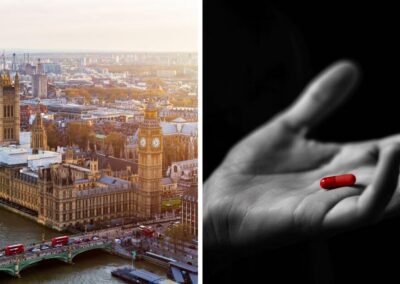Three former Conservative Prime Ministers and the former Labour Prime Minister before Keir Starmer have all come out in opposition to the assisted suicide Bill.
As MPs prepare to vote on Kim Leadbeater’s Terminally Ill Adults (End of Life) Bill this Friday, former Prime Ministers Boris Johnson, Baroness May and Liz Truss have indicated they are opposed to the Bill, which, if passed, will make assisted suicide legal for people thought to have fewer than six months to live.
Baroness Theresa May, Prime Minister between 2016 and 2019, is expected to vote against the Bill. The Telegraph reports that sources close to May said her opposition to assisted suicide legislation has not changed since she voted against it in 2015.
Liz Truss said she was “completely opposed” to the Bill. “It is wrong in principle: organs of the state like the NHS and the judicial system should be protecting lives, not ending them”.
“No doubt, as we have seen in Canada, vulnerable people would be put under appalling pressure to end their lives early. The law would be ripe for being exploited by the unscrupulous. MPs should vote this terrible Bill down and instead focus on improving health services”, she said.
According to reports, Boris Johnson would not support Leadbeater’s current assisted suicide Bill.
In an intervention last week, Gordon Brown, the previous Labour PM before Starmer, said the debate on assisted suicide is moving too quickly and instead a “fully funded, 10-year strategy for improved and comprehensive palliative care” should be set up.
Labour Cabinet divided on assisted suicide
The Health Secretary has been outspoken in his opposition to the Bill set to be voted on this Friday. Earlier this week, he ordered a review of the costs of implementing assisted suicide if Kim Leadbeater’s assisted suicide Bill is passed later this month, warning of a “chilling” scenario in which patients are pressured into ending their lives, and saying assisted suicide would “come at the expense of other choices”.
“I would hate for people to opt for assisted dying because they think they’re saving someone somewhere money, whether that’s relatives or the NHS. And I think that’s one of the issues that MPs are wrestling with as they decide how to cast their vote”, he said.
Speaking to reporters at the NHS Providers conference in Liverpool, when asked about Leadbeater’s Bill he said “Now that we’ve seen the bill published, I’ve asked my department to look at the costs that would be associated with providing a new service to enable assisted dying to go forward”.
“That work is now under way, so I can’t give you a precise figure today. You do touch on… the potential for cost savings if people choose to opt for assisted dying rather than stay in the care of providers or the NHS. I think that is a chilling slippery slope argument”.
Delivering assisted suicide would “come at the expense of other competing pressures and priorities”, he added.
Fellow Cabinet Minister Justice Secretary, Shabana Mahmood, has also been outspoken in her opposition to the assisted suicide Bill.
Mahmood voted against making assisted suicide legal in 2015 and she has remained a vocal opponent of assisted suicide. In July this year, she said, “I don’t intend to support it”.
“I know some MPs who support this issue think, ‘For God’s sake, we’re not a nation of granny killers, what’s wrong with you’… [But] once you cross that line, you’ve crossed it forever. If it becomes the norm that at a certain age or with certain diseases, you are now a bit of a burden… that’s a really dangerous position”.
It is also understood that Angela Rayner and the Education Secretary, Bridget Phillipson, as well as Chief Secretary to the Treasury Darren Jones and Business Secretary Jonathan Reynolds have all indicated they will not vote in favour of the Bill either.
Spokesperson for Right To Life UK, Catherine Robinson, said “The opposition to this dangerous Bill is growing rapidly. These former Prime Ministers join the Mother and Father of the House as well as members of the Labour Cabinet in voicing their concerns about assisted suicide”.
“Those who are terminally ill need assistance to live, not to die”.












